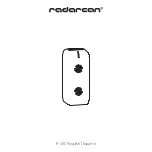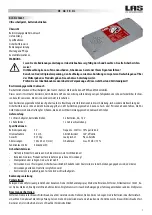
Table 13:
Predefined user categories
Username
User rights
VIEWER
Read only access
OPERATOR
•
Selecting remote or local state with
(only locally)
•
Changing setting groups
•
Controlling
•
Clearing indications
ENGINEER
•
Changing settings
•
Clearing event list
•
Clearing disturbance records
•
Changing system settings such as IP address, serial baud rate
or disturbance recorder settings
•
Setting the IED to test mode
•
Selecting language
ADMINISTRATOR
•
All listed above
•
Changing password
•
Factory default activation
For user authorization for PCM600, see PCM600 documentation.
3.5
Communication
The IED supports a range of communication protocols including IEC 61850, IEC
60870-5-103, Modbus
®
and DNP3. Operational information and controls are
available through these protocols. However, some communication functionality,
for example, horizontal communication between the IEDs, is only enabled by the
IEC 61850 communication protocol.
The IEC 61850 communication implementation supports all monitoring and
control functions. Additionally, parameter settings, disturbance recordings and
fault records can be accessed using the IEC 61850 protocol. Disturbance recordings
are available to any Ethernet-based application in the standard COMTRADE file
format. The IED can send and receive binary signals from other IEDs (so called
horizontal communication) using the IEC61850-8-1 GOOSE profile, where the
highest performance class with a total transmission time of 3 ms is supported.
Further, the IED supports sending and receiving of analog values using GOOSE
messaging. The IED meets the GOOSE performance requirements for tripping
applications in distribution substations, as defined by the IEC 61850 standard. The
IED can simultaneously report events to five different clients on the station bus.
The IED can support five simultaneous clients. If PCM600 reserves one client
connection, only four client connections are left, for example, for IEC 61850 and
Modbus.
Section 3
1MRS756708 C
615 series overview
28
615 series
Operation Manual
















































